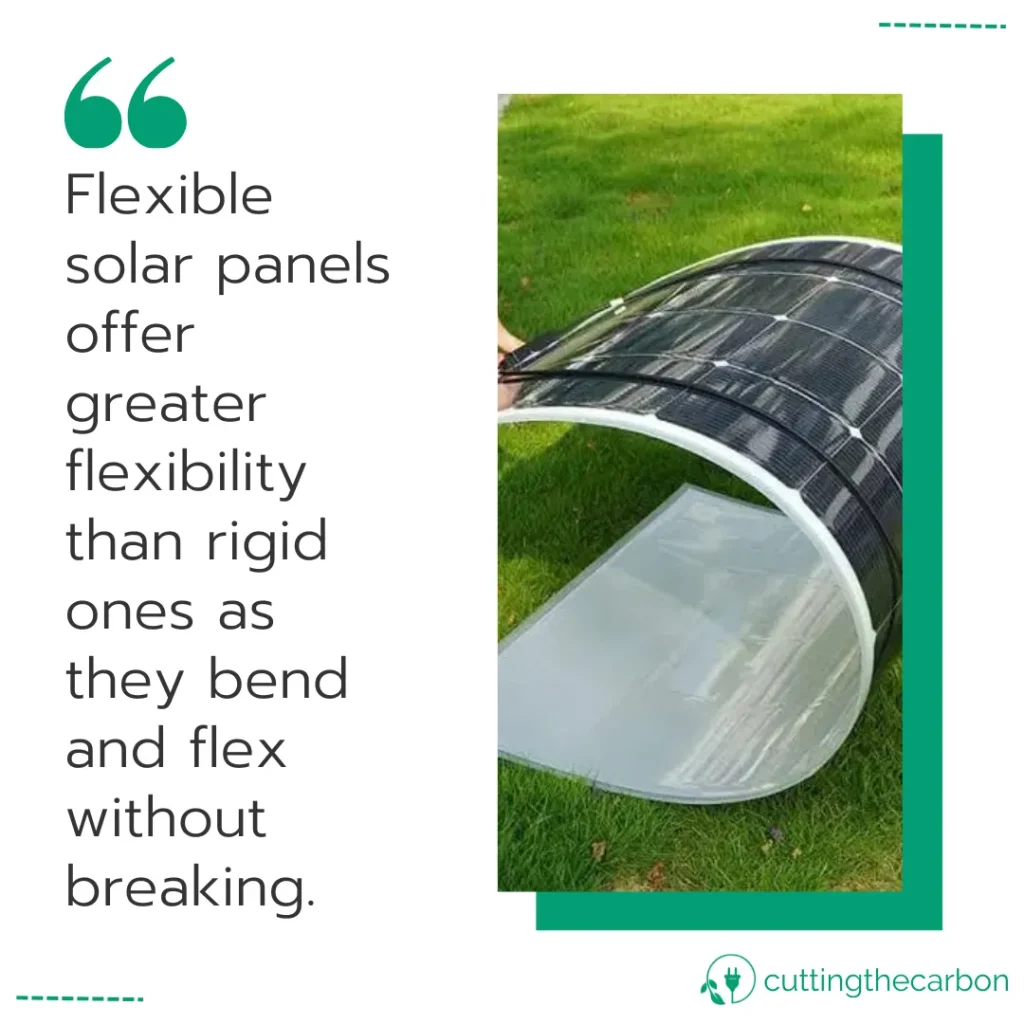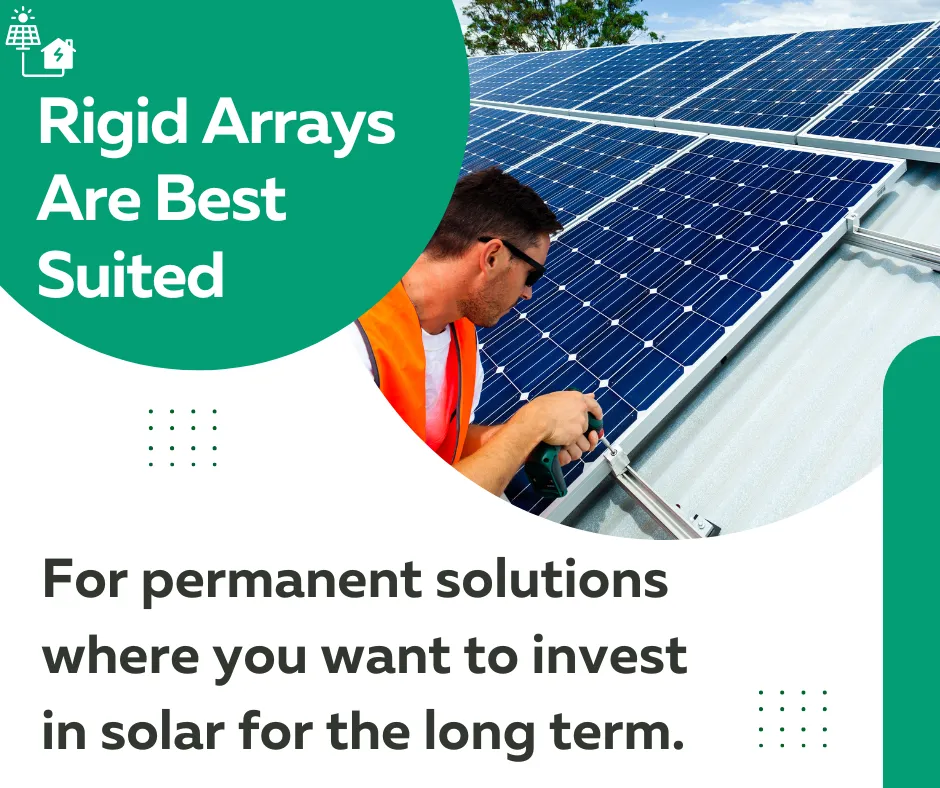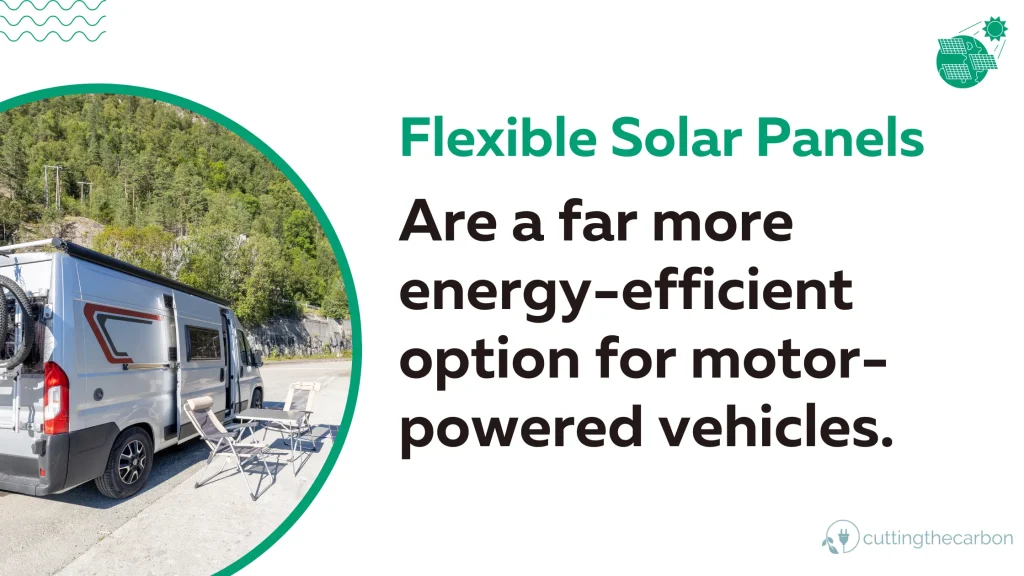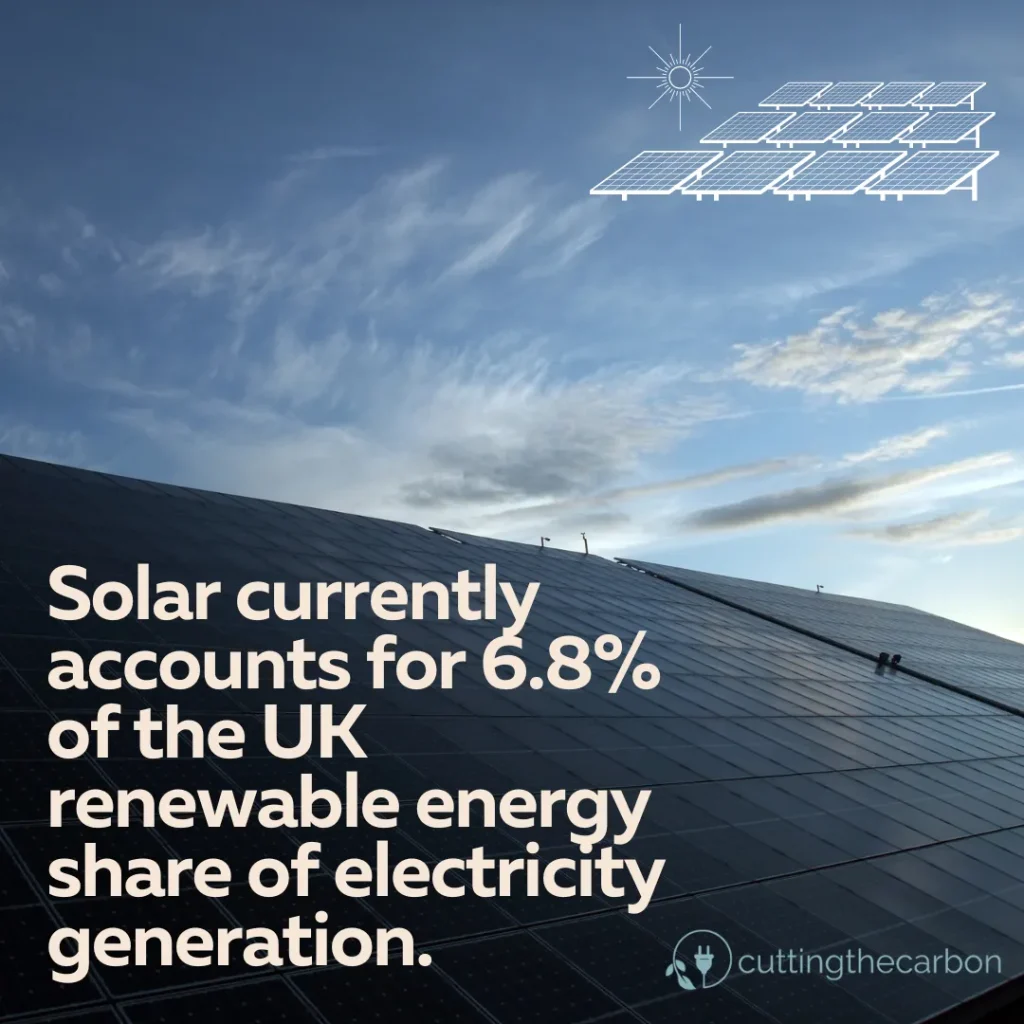Are you contemplating upgrading to solar power but find yourself torn between flexible and rigid panels? This decision is not always straightforward, as both types have unique strengths and weaknesses.
We will provide a comprehensive flexible vs rigid solar panels guide on the essential differences, advantages, and disadvantages of these two varieties of solar panels. Ready to delve into the world of solar energy? Let’s get started.
Important Considerations
- Flexible solar panels are lightweight, easy to install, and can bend without breaking, making them ideal for unconventional shapes or low-profile installations. However, rigid panels may have lower efficiency ratings and shorter lifespans.
- Rigid solar panels offer better durability and a longer lifespan. They are encased in tempered glass and an aluminium frame, making them resilient against wear and tear and weather damage. They also have higher power generation efficiency but require a more complex installation process.
- Power output, durability, weight, installation ease, and warranty should be considered when choosing between flexible and rigid solar panels.
- Ultimately, the choice between flexible or rigid solar panels depends on specific needs and circumstances, such as power requirements, available space for installation, budget constraints, and desired aesthetic appeal.
Summary of the pros and cons of flexible and rigid solar panels for vehicles and boats:
| Factor | Rigid Solar Panels | Flexible Solar Panels |
|---|---|---|
| Durability | Very durable, can withstand all kinds of weather, and is typically installed with sturdy brackets. | Less durable, more prone to scratching or gouging. |
| Weight | Depending on skill set, it can be overwhelming or straightforward but involves putting holes in the roof. | Lighter (a 100W panel weighs 4 lbs), less than a quarter of the weight of rigid panels. |
| Installation | It can flex up to 248 degrees, adaptable to almost any curved surface. | Generally simpler, involves using industrial adhesive, and puts fewer holes in the roof. |
| Flexibility | Rigid and non-flexible, best for flat surfaces or flat roofs. | Depending on your skill set, it can be overwhelming or straightforward but involves putting holes in the roof. |
| Cost | Less expensive. | Nearly twice the price of rigid panels. |
| Efficiency | Can be installed to optimize solar angle throughout the year with no obvious noise issues. | Difficult to alter the angle to optimize solar gain, but has raised dots on the surface to gather sunlight despite the angle. |
| Best For | Larger RVs, big rigs, and stationary installations. | Ultra-light trailers, non-traditional RV shapes, ultra-light vehicles, and sailboats. |
Please note that the choice between rigid and flexible solar panels depends on your specific needs and circumstances, such as the shape and weight of your vehicle, where you intend to use the panels and your budget.

Understanding Flexible Solar Panels
As mentioned above, flexible solar panels can bend and flex without breaking or experiencing damage. This makes them perfect for unusual shapes or lower-profile installs.
Advantages of Flexible Solar Panels
Flexible solar panels offer a host of significant benefits, especially for those seeking an efficient and adaptive renewable energy solution:
- Flexibility is the key advantage of these panels – they can bend without breaking or getting damaged.
- They allow for more mounting configurations and locations due to their pliable nature.
- With a significantly lighter weight than rigid counterparts, flexible solar panels introduce ease in the installation process and later expansion.
- Some models come with double-sided tape or other adhesives on the back, eliminating the need for drilling holes, and delivering a hassle-free set-up process.
- The low-profile build of these panels blends perfectly with architectural aesthetics, providing an unobtrusive power solution.
- Ideal for lightweight RV roofs or unusually shaped placements which cannot support heavy installations.
- Despite being more expensive than traditional panels initially, they save money in the long run due to reduced installation costs and complexities.
Disadvantages of Flexible Solar Panels
Though innovative, flexible solar panels come with their own challenges:
- With a higher upfront cost than rigid panels, flexible solar panels could dent your budget.
- Over the years, you might end up spending more on these panels due to their shorter lifespan and the need for frequent replacements.
- Despite advancements in solar technology, flexible panels still struggle to match the power generation efficiency of their rigid counterparts.
- One major drawback is the lack of an air gap when mounting flexible panels directly onto a surface; this can lead to potential power loss on hot days due to overheating as heat transfer remains unoptimised.
- Additionally, flexible ones may risk being blown away by high winds without secure installation, like screws or brackets used in rigid panels.
- Their lightweight and thin plastic construction leaves them vulnerable to wear and tear and weather damage, more so than aluminium case or tempered glass-clad rigid versions.
- Despite their ease of installation with adhesives or double-sided tape instead of the drilling and racking system required for rigid panel setup, they fall back in terms of reliability.

Understanding Rigid Solar Panels
Rigid solar panels are stiff and encased in glass for durability and protection.
Advantages of Rigid Solar Panels
Rigid solar panels hold numerous benefits for users, especially those seeking an energy solution that is durable and efficient:
- These panels are encased in tempered glass and an anti-corrosive aluminium frame, making them highly resilient against wear and tear and weather damage.
- They offer higher power generation efficiency than their flexible counterparts, meaning they can convert more sunlight into usable electricity.
- Proper installation allows an air gap for airflow and cooling, so rigid solar panels have a lower risk of overheating, maintaining efficiency even on hot sunny days.
- Rigid solar panels usually have a longer lifespan needing less frequent replacement over time, which makes them cost-effective in the long run despite upfront costs.
- Even though they are heavier than flexible panels, their durability makes them ideal for permanent installations where weight isn’t the major concern.
- The sturdy build also increases their resistance against high wind speeds and heavy snow loads, making them a reliable choice for regions with high weather extremes.
- Though requiring additional mounting hardware, rigid solar panel installation offers secure placement ensuring safety during extreme conditions such as storms or high winds.
Disadvantages of Rigid Solar Panels
Rigid solar panels come with their own set of disadvantages. Here are some of the drawbacks to consider:
- Cost: Rigid panels tend to be more expensive than flexible panels, making them a less budget-friendly option for some consumers.
- Installation Process: Rigid panels require a racking system and drilling, which adds to the overall installation cost. This can be cumbersome and time-consuming for those who prefer a simpler installation process.
- Weight: Rigid panels are heavier than their flexible counterparts, making them more challenging to transport and install. This can limit their suitability for certain applications, such as mobile solar setups or installations on lightweight RV roofs.
- Heat Buildup: When exposed to direct sunlight for extended periods, rigid panels can become extremely hot, reaching temperatures over 160°F. This heat buildup can reduce efficiency and potential damage if not properly managed.
- Limited Flexibility: Unlike flexible panels that can bend and conform to various surfaces, rigid panels do not offer much flexibility regarding shape and size requirements. This makes them less suitable for unconventional or unusually shaped placements.
- Durability: While rigid panels are generally more durable than flexible ones, they are still susceptible to wear and tear over time. Due to their glass-encased construction, they may also be more prone to weather damage.
- Lifespan: Although rigid panels have a longer lifespan than flexible ones, they may still require replacement after a certain period due to degradation or damage from external factors like hail or debris.
- Efficiency: Rigid panels generally have higher efficiency ratings compared to flexible ones. However, compared to other types of solar technology, such as thin-film panels, they may have lower conversion efficiency.
- Overheating Issues: Rigid solar panels without proper ventilation and airflow can experience overheating issues that reduce their performance and lifespan over time.

Comparison between Flexible and Rigid Solar Panels
Weight
As the name suggests, flexible solar panels are lighter than their rigid counterparts. Typically, flexible panels weigh just a few kilograms, which is less than half the weight of rigid solar panels. This makes them easy to transport and install, particularly on structures such as mobile homes, boats, or buildings with lightweight roofs. Flexible solar panels can also be easier to remove.
On the other hand, rigid solar panels are heavier, usually weighing between 18-20 kilograms. This is due to the aluminium and glass used in their construction, which add to their robustness and durability.
Efficiency
Regarding efficiency, rigid solar panels tend to be more efficient than flexible panels. With greater technological advancements, rigid panels can produce a higher energy harvest per square meter. Some premium brands offer efficiency rates of up to 22.8%.
In comparison, flexible solar panels have lower efficiency rates, typically around 10-12%. However, this is constantly improving with innovations in flexible panel technology.
Durability
Due to their sturdy construction, Rigid solar panels tend to be more resistant to harsh weather conditions. They can withstand heavy rain, wind, and snow, making them ideal for the sometimes challenging UK climate.
Flexible solar panels, while easy to install, are traditionally less durable due to their thin construction. However, recent advancements in manufacturing techniques have improved this significantly.
Lifespan
Given their durability, Rigid panels have a longer lifespan of 25-35 years. Some manufacturers offer warranties that closely match these figures, providing customer peace of mind.
Flexible panels, on the other hand, have a shorter lifespan – generally around 10-15 years. Despite this, they offer a practical solution for situations where portability and weight are important.
Both flexible and rigid solar panels have their distinct advantages. Your choice will largely depend on your specific needs, such as the location and structure of installation, budget, and energy needs.
Installation Process
Both flexible and rigid solar panels have different installation processes. Flexible panels can be mounted using double-sided tape or other adhesives, eliminating the need for drilling holes.
This makes the installation process much easier and avoids damaging the surface you’re mounting them on. On the other hand, rigid panels require mounting hardware for installation, which allows for airflow and cooling to prevent overheating.
The installation process may vary depending on panel size, type, and location. Adequate ventilation is important to reduce heat buildup in flexible panels during installation, while durability and cost should be considered when choosing between the two options.
Flexible Vs Rigid Solar Panels Full Technical Comparison Video
Factors to Consider when Choosing Between Flexible and Rigid Solar Panels
When choosing between flexible and rigid solar panels, it is important to consider factors such as power output, bending angle, size and weight, ease of installation, and warranty.
Power Output
Power output is a crucial factor to consider when choosing between flexible and rigid solar panels. Flexible panels generally have lower efficiency ratings than traditional rigid panels, which may generate electricity less efficiently.
Additionally, flexible panels that are mounted directly onto a surface without an air gap for cooling can potentially experience heat buildup and reduced performance on hot days. On the other hand, rigid panels with their mounting hardware allow for airflow and cooling, reducing the risk of overheating and ensuring more reliable power generation.
Ultimately, the decision should consider your specific power needs and preferences to choose the panel that will provide the optimal power output for your solar energy system.
Bending Angle
Flexible solar panels offer the advantage of being able to be bent up to 30 degrees, providing more options for mounting and flexibility. This means they can easily adapt to different shapes and sizes, making them suitable for RV rooftop spaces or other installations with unusually shaped placements.
However, it’s important to remember that the bending angle of flexible panels depends on factors such as panel size, type, angle and orientation, ambient temperature, and humidity levels.
Bending them beyond their recommended angle can cause damage and affect their performance. So while flexibility is an advantage, it’s crucial to ensure that you stay within the recommended bending limits for optimal functioning of your flexible solar panels.

Size and Weight
One important factor to consider when choosing between flexible and rigid solar panels is the size and weight. Flexible panels are significantly lighter than rigid panels, weighing around four to five lbs each.
This makes them a great option for mobile solar setups, such as on motorhomes, vans, or boats. On the other hand, rigid panels are heavier due to their glass-encased construction. While this may limit their use in certain applications where weight is a concern, it also provides durability and a longer lifespan than flexible panels.
Ultimately, the choice between flexible and rigid panels depends on factors such as power needs, panel location, and budget.
Ease of Installation
Flexible solar panels are known for their ease of installation, making them a popular choice for many homeowners in the UK. These lightweight panels can be easily mounted on various surfaces using double-sided tape or adhesive, eliminating the need for complex drilling or professional help.
On the other hand, rigid solar panels require a more intricate installation process and may even require assistance from a solar installation expert. The simpler installation process of flexible panels makes them particularly suitable for DIY enthusiasts and those looking to save time and effort when setting up their solar power system.
Warranty
Flexible solar panels may have a shorter warranty period than rigid panels, and the length of the warranty can vary depending on the manufacturer and model. It’s important to consider the terms and conditions of the warranty, including any exclusions or limitations.
Factors such as the type of solar panel, its size, and installation method can also affect warranty coverage. Proper installation and regular maintenance are crucial in ensuring your flexible solar panels remain valid under warranty.
Additionally, it’s worth noting that temperature can impact their performance, so proper ventilation and airflow are important for optimizing their efficiency.
Flexible vs Rigid Solar Panels On An RV (Video)
Use Cases for Flexible and Rigid Solar Panels
Flexible solar panels are a great option for those who have unconventional shapes or low-profile installations. Their lightweight and flexible design makes them easy to install on various surfaces, such as motorhomes, vans, and boats.
These panels can be mounted using adhesive tape, eliminating the need for drilling holes and making installation hassle-free. On the other hand, rigid solar panels are more durable and cost-effective in the long run.
They are ideal for permanent solutions where durability is crucial, such as mounting on rooftops or professional installations by solar experts. Rigid panels also allow airflow and cooling with their mounting hardware, reducing the risk of overheating and increasing overall efficiency.
Regarding use cases, flexible panels are perfect for individuals who enjoy recreational power setups or want a portable solar panel option that can be easily transported. They are also suitable for those who prefer a lightweight solution without compromising energy absorption capabilities.
Rigid panels, on the other hand, provide reliable power generation for homes or commercial buildings where high energy output is needed consistently over time. Flexible and rigid solar panels offer unique benefits depending on your needs and circumstances.
Flexible vs Rigid Solar Panels Final Thoughts
In conclusion, when it comes to choosing between flexible and rigid solar panels, it all depends on your specific needs and circumstances. Flexible panels offer the advantage of bending without breaking, making them perfect for unconventional shapes or low-profile installations.
However, they may come with higher long-term costs and lower efficiency. On the other hand, rigid panels are more durable and cost-effective in the long run, but they lack the flexibility of their counterparts.
Consider factors such as power output, mounting options, weight, installation ease, and warranty before deciding.
Difference Between Flexible And Rigid Solar Panels FAQs
What is the difference between flexible and rigid solar panels?
Flexible solar panels are made with a thin, lightweight material that can bend to fit curved surfaces, while rigid solar panels are made with a solid structure that cannot be bent.
Which type of solar panel is more durable?
Rigid solar panels are more durable than flexible ones as they have a stronger construction and are less susceptible to damage from bending or flexing.
Can flexible solar panels generate the same amount of power as rigid ones?
Flexible solar panels generally have lower efficiency ratings than rigid ones, meaning they may not generate as much power for the same surface area. However, technological advancements are continually improving the efficiency of flexible solar panels.
Are there any specific applications where flexible or rigid solar panels are better suited?
Flexible solar panels are ideal for applications where weight and flexibility are important, such as on boats or curved surfaces. Rigid solar panels are typically used in fixed installations like rooftops or ground-mounted systems where durability and maximum power output are prioritised.

